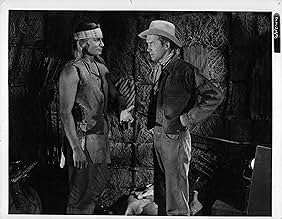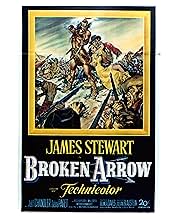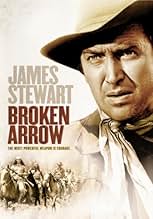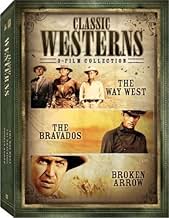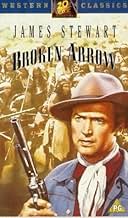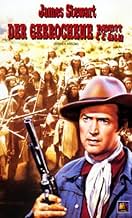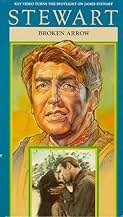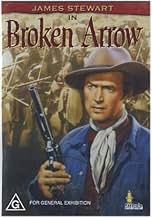AVALIAÇÃO DA IMDb
7,1/10
10 mil
SUA AVALIAÇÃO
Tom Jeffords tenta fazer a paz entre colonos e apaches no território do Arizona.Tom Jeffords tenta fazer a paz entre colonos e apaches no território do Arizona.Tom Jeffords tenta fazer a paz entre colonos e apaches no território do Arizona.
- Direção
- Roteiristas
- Artistas
- Indicado a 3 Oscars
- 4 vitórias e 6 indicações no total
Joyce Mackenzie
- Terry
- (as Joyce MacKenzie)
Robert Adler
- Lonergan - Stage Driver
- (não creditado)
Trevor Bardette
- Stage Passenger
- (não creditado)
Chris Willow Bird
- Nochalo
- (não creditado)
Raymond Bramley
- Col. Bernall
- (não creditado)
Chet Brandenburg
- Miner
- (não creditado)
Argentina Brunetti
- Nalikadeya - Cochise's Wife
- (não creditado)
Harry Carter
- Miner
- (não creditado)
Iron Eyes Cody
- Teese
- (não creditado)
J.W. Cody
- Pionsenay - Chosen Warrior
- (não creditado)
Heinie Conklin
- Townsman
- (não creditado)
Dolores Christine Cypert
- American Indian
- (não creditado)
- …
- Direção
- Roteiristas
- Elenco e equipe completos
- Produção, bilheteria e muito mais no IMDbPro
Avaliações em destaque
Broken Arrow was actually the start of James Stewart's return to the western genre. His first western was Destry Rides Again in 1939 and he waited for over 10 years to do another. After that he did them quite regularly.
Broken Arrow was made first, but held up over a year before release so Winchester 73 was actually Stewart's official return to the west. But both films had a lasting impact on his career.
This is the story of Army Captain Tom Jeffords who with a simple act of kindness started a peace process with the Apaches led by their charismatic leader Cochise. Jeffords, a veteran of the Union Army and the frontier wars is heartily sick of the slaughter he's witnessed and participated in. He finds an Indian boy who's been wounded by whites and he tends to them and heals him.
One thing leads to another and pretty soon Jeffords finds himself in the camp of Cochise with whom he strikes up a friendship. He also woos and wins an Apache maid named Sonseehray. Jeffords and Cochise with General Oliver O. Howard make a treaty with the Apache, at least most of them.
Broken Arrow did a lot for James Stewart, but even more for Jeff Chandler who plays Cochise. Cochise was a man in his late 60s when this was really taking place, but Chandler in his prematurely gray hair, portrays him well. Chandler got an Oscar nomination for Best Supporting Actor for Cochise.
Jeffords and Cochise are men of good will and decency who see an honest peace as the only answer. Of course both have to contend with people who won't or can't accept peace with the other race. It's those people and what they do break the peace that is the rest of Broken Arrow's story.
Delmar Daves is a good director of western films and in fact did another film about the U.S. government trying to make peace with another Indian tribe, the Modocs in Oregon, in the film Drumbeat. He gets good results out of the rest of the cast. Note the performances of Will Geer as an Indian hating rancher, Debra Paget as Sonseehray, and Basil Ruysdael as General Howard.
The screenplay was done by Albert Maltz of the Hollywood Ten. How ironic that Maltz was blacklisted after this film. I suppose a film about peace between the races and good will towards one's fellow men was highly subversive.
Broken Arrow was given much acclaim for being the first film to express the view that Indians were something more than bloodthirsty savages. That's not exactly true, other films around that time started saying the same thing. Nevertheless Broken Arrow's message is an eternal one.
Says so in the Scriptures if I'm not mistaken.
Broken Arrow was made first, but held up over a year before release so Winchester 73 was actually Stewart's official return to the west. But both films had a lasting impact on his career.
This is the story of Army Captain Tom Jeffords who with a simple act of kindness started a peace process with the Apaches led by their charismatic leader Cochise. Jeffords, a veteran of the Union Army and the frontier wars is heartily sick of the slaughter he's witnessed and participated in. He finds an Indian boy who's been wounded by whites and he tends to them and heals him.
One thing leads to another and pretty soon Jeffords finds himself in the camp of Cochise with whom he strikes up a friendship. He also woos and wins an Apache maid named Sonseehray. Jeffords and Cochise with General Oliver O. Howard make a treaty with the Apache, at least most of them.
Broken Arrow did a lot for James Stewart, but even more for Jeff Chandler who plays Cochise. Cochise was a man in his late 60s when this was really taking place, but Chandler in his prematurely gray hair, portrays him well. Chandler got an Oscar nomination for Best Supporting Actor for Cochise.
Jeffords and Cochise are men of good will and decency who see an honest peace as the only answer. Of course both have to contend with people who won't or can't accept peace with the other race. It's those people and what they do break the peace that is the rest of Broken Arrow's story.
Delmar Daves is a good director of western films and in fact did another film about the U.S. government trying to make peace with another Indian tribe, the Modocs in Oregon, in the film Drumbeat. He gets good results out of the rest of the cast. Note the performances of Will Geer as an Indian hating rancher, Debra Paget as Sonseehray, and Basil Ruysdael as General Howard.
The screenplay was done by Albert Maltz of the Hollywood Ten. How ironic that Maltz was blacklisted after this film. I suppose a film about peace between the races and good will towards one's fellow men was highly subversive.
Broken Arrow was given much acclaim for being the first film to express the view that Indians were something more than bloodthirsty savages. That's not exactly true, other films around that time started saying the same thing. Nevertheless Broken Arrow's message is an eternal one.
Says so in the Scriptures if I'm not mistaken.
Released in 1950 and directed by Delmer Daves, "Broken Arrow" stars Jimmy Stewart as a former soldier, Tom Jeffords, who saves an Apache teen after ten years of war between settlers and Natives in 1870, Arizona. When the boy's elders extend him mercy Jeffords sees the Apaches as human beings rather than faceless enemies for the first time and becomes the mediator between the warring factions. Jeff Chandler is stunning as the Apache leader, Cochise, but Debra Paget, only 16 years-old during filming, looks too whitebread to be believable. I love Debra, but casting her in this role is eye-rolling. To the film's credit, several of the peripheral Apache characters are played by Native Americans, including Jay Silverheels and John War Eagle.
The emphasis is on the Apache way of life and the movie is touted as the first pro-Indian Western ("pro-Indian" to a point), but this simply isn't the case. "Buffalo Bill" with Joel McCrea came out six years earlier and it was clearly favorable toward the Natives. "Broken Arrow" just goes a little further in this direction. Regardless, it is amazing to view Westerns from this long ago that are evenhanded regarding the Indian Wars, honestly portraying the Natives as hostile and formidable, but also with respect to their perspective and way of life. While obviously dated in some respects, both "Buffalo Bill" and "Broken Arrow" stand the test of time and remain entertaining and even enlightening to this day.
The movie runs 93 minutes and was shot in Arizona, but also Iversion Ranch & Alabama Hills, California.
GRADE: B+ or A-
The emphasis is on the Apache way of life and the movie is touted as the first pro-Indian Western ("pro-Indian" to a point), but this simply isn't the case. "Buffalo Bill" with Joel McCrea came out six years earlier and it was clearly favorable toward the Natives. "Broken Arrow" just goes a little further in this direction. Regardless, it is amazing to view Westerns from this long ago that are evenhanded regarding the Indian Wars, honestly portraying the Natives as hostile and formidable, but also with respect to their perspective and way of life. While obviously dated in some respects, both "Buffalo Bill" and "Broken Arrow" stand the test of time and remain entertaining and even enlightening to this day.
The movie runs 93 minutes and was shot in Arizona, but also Iversion Ranch & Alabama Hills, California.
GRADE: B+ or A-
As the war rages between the American settlers and the Apache, former soldier Tom Jeffords happens upon a young Indian wounded after an attack. Taking upon himself to aid the boy, it's not long before the Apache show up intent on killing Jeffords by way of the war instincts. Pleading for Jeffords' life, the boy manages to get him spared by the Apache chief, Cochise. It's the start of a friendship that may just bring and end to the war and peace across the west.
Tho not the first "social" Western film made, Broken Arrow, it can be argued, is maybe one of the most important and telling genre films of the 50s. Showing humanist portrayals of the Apache and dealing out level headed tellings of the relationships between whites and the Native Americans, Delmer Daves' film is as relevant today as it was back on release. Adapted from Elliott Arnold's novel Blood Brother, the story follows Jeffords (a measured and fine James Stewart) as he attempts to broker peace between the warring factions. Firstly by convincing Cochise (Jeff Chandler bang on form) to allow the mail run thru the pass, something that brings suspicion and calls of Indian lover from Jeffords' own kind, and then to finally set up a peace pact at a time when violence and hatred was rife in the west.
As the friendship between the two men grows, Jeffords and an Apache girl fall in love (beautiful Debra Paget as Sonseeahray), thus giving the story a further jolt of momentum. The screenplay then really hits its stride, as Daves and his crew pit peace and inter racial love against a backdrop of bloodshed and savagery. Never glossing over just how hard peace is going to be, Broken Arrow retains intelligence and a sensitivity even as breakaway factions from both sides (for example we see Geronimo split the Apache and form a renegade front) are intent on killing off the peace process. It even has time for deep emotional kickers to reinforce the point of just how tough and unlikely peace and tolerance can be sometimes.
Broken Arrow was, and still is, a bold picture. In fact it can be argued that for the likes of Daves and Stewart, it was at the time very bold and risky career moves. But it paid off because the film stands up today as a picture of some distinction. It's themes and approach to its subjects are something that this generation, and all the future ones, will always find to be socially important. Boosted by Hugo Friedhofer's luscious score and taking advantage of the Lone Pine location shoot, Broken Arrow is a fine fine film that even non Western fans should be looking to absorb. 8/10
Tho not the first "social" Western film made, Broken Arrow, it can be argued, is maybe one of the most important and telling genre films of the 50s. Showing humanist portrayals of the Apache and dealing out level headed tellings of the relationships between whites and the Native Americans, Delmer Daves' film is as relevant today as it was back on release. Adapted from Elliott Arnold's novel Blood Brother, the story follows Jeffords (a measured and fine James Stewart) as he attempts to broker peace between the warring factions. Firstly by convincing Cochise (Jeff Chandler bang on form) to allow the mail run thru the pass, something that brings suspicion and calls of Indian lover from Jeffords' own kind, and then to finally set up a peace pact at a time when violence and hatred was rife in the west.
As the friendship between the two men grows, Jeffords and an Apache girl fall in love (beautiful Debra Paget as Sonseeahray), thus giving the story a further jolt of momentum. The screenplay then really hits its stride, as Daves and his crew pit peace and inter racial love against a backdrop of bloodshed and savagery. Never glossing over just how hard peace is going to be, Broken Arrow retains intelligence and a sensitivity even as breakaway factions from both sides (for example we see Geronimo split the Apache and form a renegade front) are intent on killing off the peace process. It even has time for deep emotional kickers to reinforce the point of just how tough and unlikely peace and tolerance can be sometimes.
Broken Arrow was, and still is, a bold picture. In fact it can be argued that for the likes of Daves and Stewart, it was at the time very bold and risky career moves. But it paid off because the film stands up today as a picture of some distinction. It's themes and approach to its subjects are something that this generation, and all the future ones, will always find to be socially important. Boosted by Hugo Friedhofer's luscious score and taking advantage of the Lone Pine location shoot, Broken Arrow is a fine fine film that even non Western fans should be looking to absorb. 8/10
Tagline: Of this motion picture the screen can be proud... Today... Tomorrow... A generation from now...
Worth repeating this tagline, because after seeing the film again for the first time in 42 years, it's right on. 50s westerns almost universally depicted Indians as pigeon-English speaking savages... or tried to talk Indian that translated to pigeon-Indian.
While the leading cast is all-Anglo, the perspective is that both sides in the Wild West were had more than a few intelligent, caring individuals among them. A willingness to sacrifice much (including renegades) to achieve a lasting peace is the message.
Jimmy Stewart had something to lose by doing a picture like this, but the acting here stands with any in his career. The portrayal of Cochise by Jeff Chandler is powerful, although unquestionably a little bit too noble-savagish.
"Let's mosey on over there" is a line spoken by Stewart toward the end of the film. Takes you back to a time when people took time to mosey.
A good-hearted picture by a little-known director standing up against the prevailing stereotypes. Wouldn't be surprised if Costner watched it more than once before making "Dances with Wolves".
Worth repeating this tagline, because after seeing the film again for the first time in 42 years, it's right on. 50s westerns almost universally depicted Indians as pigeon-English speaking savages... or tried to talk Indian that translated to pigeon-Indian.
While the leading cast is all-Anglo, the perspective is that both sides in the Wild West were had more than a few intelligent, caring individuals among them. A willingness to sacrifice much (including renegades) to achieve a lasting peace is the message.
Jimmy Stewart had something to lose by doing a picture like this, but the acting here stands with any in his career. The portrayal of Cochise by Jeff Chandler is powerful, although unquestionably a little bit too noble-savagish.
"Let's mosey on over there" is a line spoken by Stewart toward the end of the film. Takes you back to a time when people took time to mosey.
A good-hearted picture by a little-known director standing up against the prevailing stereotypes. Wouldn't be surprised if Costner watched it more than once before making "Dances with Wolves".
Although the story is entertaining and the performances of James Stewart, Jeff Chandler and Debra Paget outstanding, what makes Broken Arrow a landmark film is its portrayal of the Apache Indians as something more than savage killers. Indians in the movies were always seen as brutal and inhuman. Here they are seen as people who want what the "white men" wanted: to live in freedom with their families on their own land and to live their lives in their own way.
Jeff Chandler is terrific as Apache leader Cochise, who he would play twice more in other films. There is a moving scene when they return from battle and he recites the names of those killed with a pained look in his eyes. Cochise and Stewart's character have a relationship which grows from mutual respect to a true friendship as they try to work out peace between the whites and indians. Stewart is looked on as a traitor by his friends and things are complicated further by his relationship with the young Apache girl played by Debra Paget.
I cannot think of another western in which indians have been portrayed as real people with emotions who hurt, who love. When this film was released 50 years ago, blacks, asians and American Indians were still being portrayed using the worst kinds of racial stereotypes.
Jeff Chandler is terrific as Apache leader Cochise, who he would play twice more in other films. There is a moving scene when they return from battle and he recites the names of those killed with a pained look in his eyes. Cochise and Stewart's character have a relationship which grows from mutual respect to a true friendship as they try to work out peace between the whites and indians. Stewart is looked on as a traitor by his friends and things are complicated further by his relationship with the young Apache girl played by Debra Paget.
I cannot think of another western in which indians have been portrayed as real people with emotions who hurt, who love. When this film was released 50 years ago, blacks, asians and American Indians were still being portrayed using the worst kinds of racial stereotypes.
Você sabia?
- CuriosidadesThe broken arrow, which signals an end to fighting, is in fact a Blackfoot Indian symbol, not an Apache symbol. The Blackfoot are native to Montana and Alberta, Canada.
- Erros de gravaçãoWhen General Howard is beginning to pick himself off the ground after the Apache attack on the military wagon train, the first shot shows the ground to be mostly desert sand, with very little vegetation, but when the scene jumps to a long shot of the General getting up, the ground around him is almost entirely covered with green vegetation, showing scarcely any sand at all.
- ConexõesFeatured in Family Classics: Family Classics: Broken Arrow (1963)
Principais escolhas
Faça login para avaliar e ver a lista de recomendações personalizadas
- How long is Broken Arrow?Fornecido pela Alexa
Detalhes
Bilheteria
- Faturamento bruto mundial
- US$ 10.145
- Tempo de duração
- 1 h 33 min(93 min)
- Proporção
- 1.37 : 1
Contribua para esta página
Sugerir uma alteração ou adicionar conteúdo ausente


